Customer Satisfaction and Hotel Growth: Arbor Hyde Park Hotel Analysis
VerifiedAdded on 2019/12/28
|37
|9630
|165
Report
AI Summary
This report examines the impact of customer satisfaction on the growth and sustainability of the Arbor Hyde Park Hotel, a case study within the UK's competitive hospitality industry. The study investigates the importance of customer satisfaction, the need to meet customer expectations for future growth, and the benefits of client satisfaction on hotel operations. The research includes a literature review, research methodology, data analysis, and conclusion with recommendations. The findings highlight the significance of customer satisfaction for retaining customers, enhancing business volume, and ensuring long-term success. The report aims to provide actionable strategies for the Arbor Hyde Park Hotel to improve customer satisfaction and achieve sustainable growth in the face of increasing competition. The study emphasizes the importance of meeting and exceeding customer expectations to foster loyalty and drive positive business outcomes.
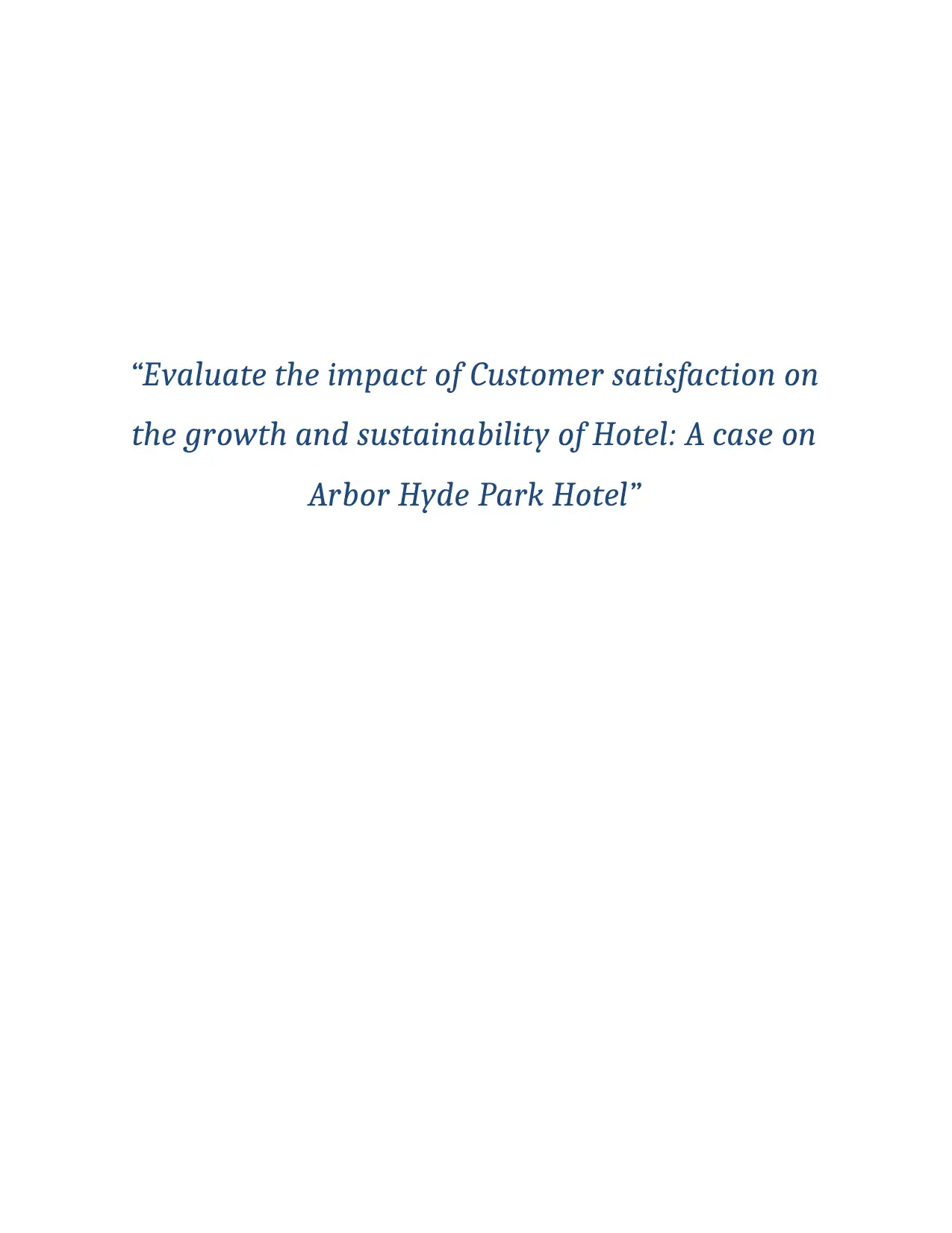
“Evaluate the impact of Customer satisfaction on
the growth and sustainability of Hotel: A case on
Arbor Hyde Park Hotel”
the growth and sustainability of Hotel: A case on
Arbor Hyde Park Hotel”
Paraphrase This Document
Need a fresh take? Get an instant paraphrase of this document with our AI Paraphraser
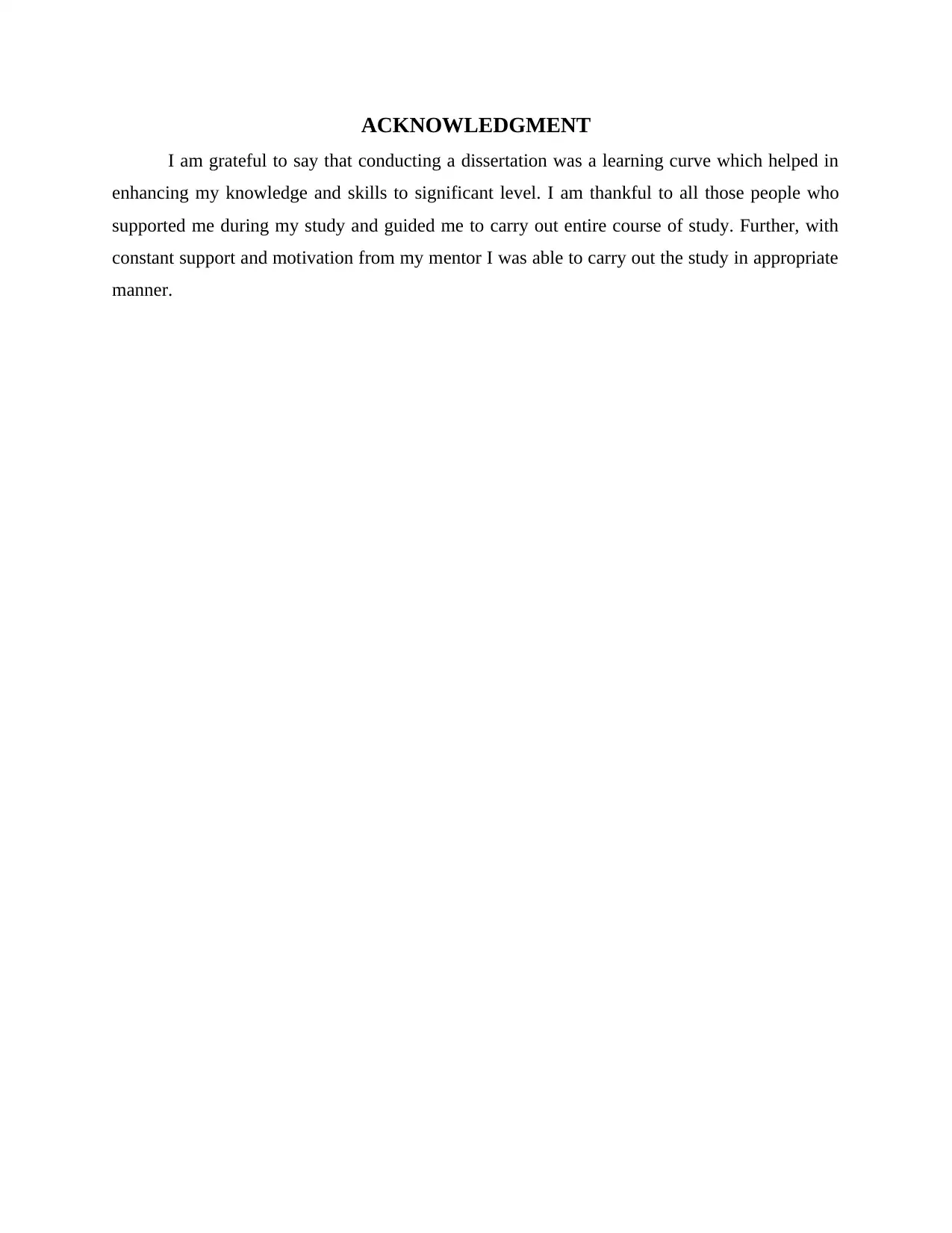
ACKNOWLEDGMENT
I am grateful to say that conducting a dissertation was a learning curve which helped in
enhancing my knowledge and skills to significant level. I am thankful to all those people who
supported me during my study and guided me to carry out entire course of study. Further, with
constant support and motivation from my mentor I was able to carry out the study in appropriate
manner.
I am grateful to say that conducting a dissertation was a learning curve which helped in
enhancing my knowledge and skills to significant level. I am thankful to all those people who
supported me during my study and guided me to carry out entire course of study. Further, with
constant support and motivation from my mentor I was able to carry out the study in appropriate
manner.
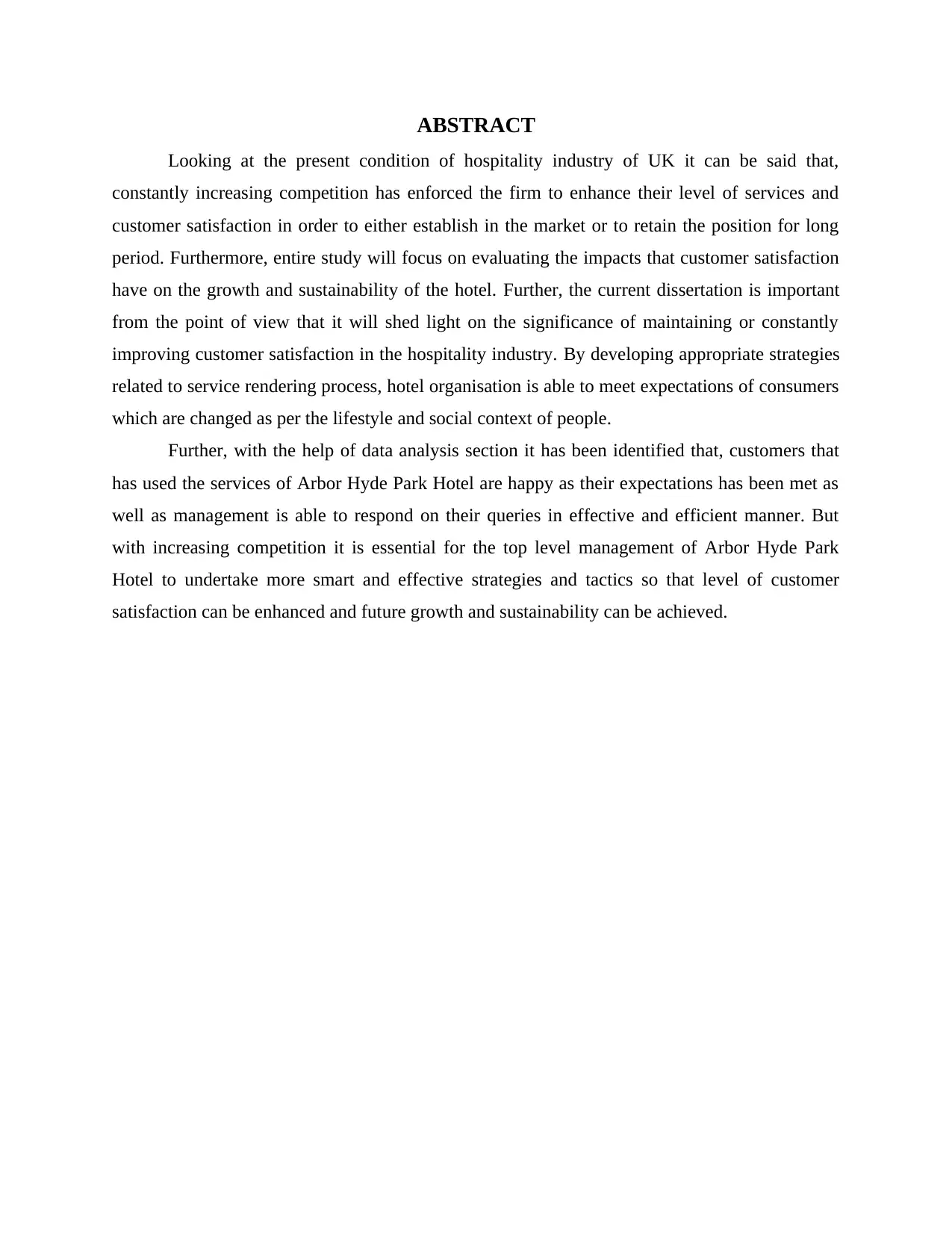
ABSTRACT
Looking at the present condition of hospitality industry of UK it can be said that,
constantly increasing competition has enforced the firm to enhance their level of services and
customer satisfaction in order to either establish in the market or to retain the position for long
period. Furthermore, entire study will focus on evaluating the impacts that customer satisfaction
have on the growth and sustainability of the hotel. Further, the current dissertation is important
from the point of view that it will shed light on the significance of maintaining or constantly
improving customer satisfaction in the hospitality industry. By developing appropriate strategies
related to service rendering process, hotel organisation is able to meet expectations of consumers
which are changed as per the lifestyle and social context of people.
Further, with the help of data analysis section it has been identified that, customers that
has used the services of Arbor Hyde Park Hotel are happy as their expectations has been met as
well as management is able to respond on their queries in effective and efficient manner. But
with increasing competition it is essential for the top level management of Arbor Hyde Park
Hotel to undertake more smart and effective strategies and tactics so that level of customer
satisfaction can be enhanced and future growth and sustainability can be achieved.
Looking at the present condition of hospitality industry of UK it can be said that,
constantly increasing competition has enforced the firm to enhance their level of services and
customer satisfaction in order to either establish in the market or to retain the position for long
period. Furthermore, entire study will focus on evaluating the impacts that customer satisfaction
have on the growth and sustainability of the hotel. Further, the current dissertation is important
from the point of view that it will shed light on the significance of maintaining or constantly
improving customer satisfaction in the hospitality industry. By developing appropriate strategies
related to service rendering process, hotel organisation is able to meet expectations of consumers
which are changed as per the lifestyle and social context of people.
Further, with the help of data analysis section it has been identified that, customers that
has used the services of Arbor Hyde Park Hotel are happy as their expectations has been met as
well as management is able to respond on their queries in effective and efficient manner. But
with increasing competition it is essential for the top level management of Arbor Hyde Park
Hotel to undertake more smart and effective strategies and tactics so that level of customer
satisfaction can be enhanced and future growth and sustainability can be achieved.
⊘ This is a preview!⊘
Do you want full access?
Subscribe today to unlock all pages.

Trusted by 1+ million students worldwide
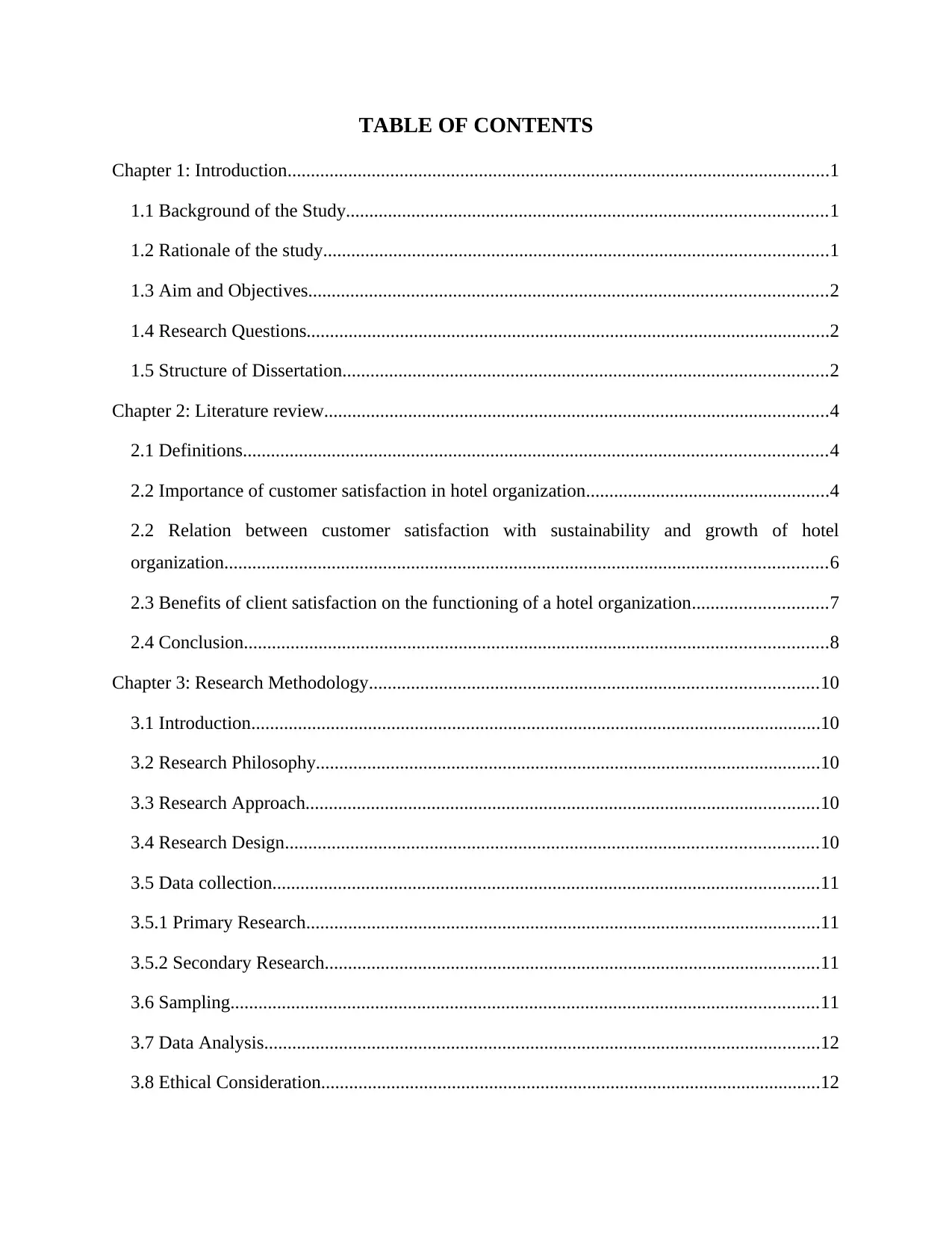
TABLE OF CONTENTS
Chapter 1: Introduction....................................................................................................................1
1.1 Background of the Study.......................................................................................................1
1.2 Rationale of the study............................................................................................................1
1.3 Aim and Objectives...............................................................................................................2
1.4 Research Questions................................................................................................................2
1.5 Structure of Dissertation........................................................................................................2
Chapter 2: Literature review............................................................................................................4
2.1 Definitions.............................................................................................................................4
2.2 Importance of customer satisfaction in hotel organization....................................................4
2.2 Relation between customer satisfaction with sustainability and growth of hotel
organization.................................................................................................................................6
2.3 Benefits of client satisfaction on the functioning of a hotel organization.............................7
2.4 Conclusion.............................................................................................................................8
Chapter 3: Research Methodology................................................................................................10
3.1 Introduction..........................................................................................................................10
3.2 Research Philosophy............................................................................................................10
3.3 Research Approach..............................................................................................................10
3.4 Research Design..................................................................................................................10
3.5 Data collection.....................................................................................................................11
3.5.1 Primary Research..............................................................................................................11
3.5.2 Secondary Research..........................................................................................................11
3.6 Sampling..............................................................................................................................11
3.7 Data Analysis.......................................................................................................................12
3.8 Ethical Consideration...........................................................................................................12
Chapter 1: Introduction....................................................................................................................1
1.1 Background of the Study.......................................................................................................1
1.2 Rationale of the study............................................................................................................1
1.3 Aim and Objectives...............................................................................................................2
1.4 Research Questions................................................................................................................2
1.5 Structure of Dissertation........................................................................................................2
Chapter 2: Literature review............................................................................................................4
2.1 Definitions.............................................................................................................................4
2.2 Importance of customer satisfaction in hotel organization....................................................4
2.2 Relation between customer satisfaction with sustainability and growth of hotel
organization.................................................................................................................................6
2.3 Benefits of client satisfaction on the functioning of a hotel organization.............................7
2.4 Conclusion.............................................................................................................................8
Chapter 3: Research Methodology................................................................................................10
3.1 Introduction..........................................................................................................................10
3.2 Research Philosophy............................................................................................................10
3.3 Research Approach..............................................................................................................10
3.4 Research Design..................................................................................................................10
3.5 Data collection.....................................................................................................................11
3.5.1 Primary Research..............................................................................................................11
3.5.2 Secondary Research..........................................................................................................11
3.6 Sampling..............................................................................................................................11
3.7 Data Analysis.......................................................................................................................12
3.8 Ethical Consideration...........................................................................................................12
Paraphrase This Document
Need a fresh take? Get an instant paraphrase of this document with our AI Paraphraser
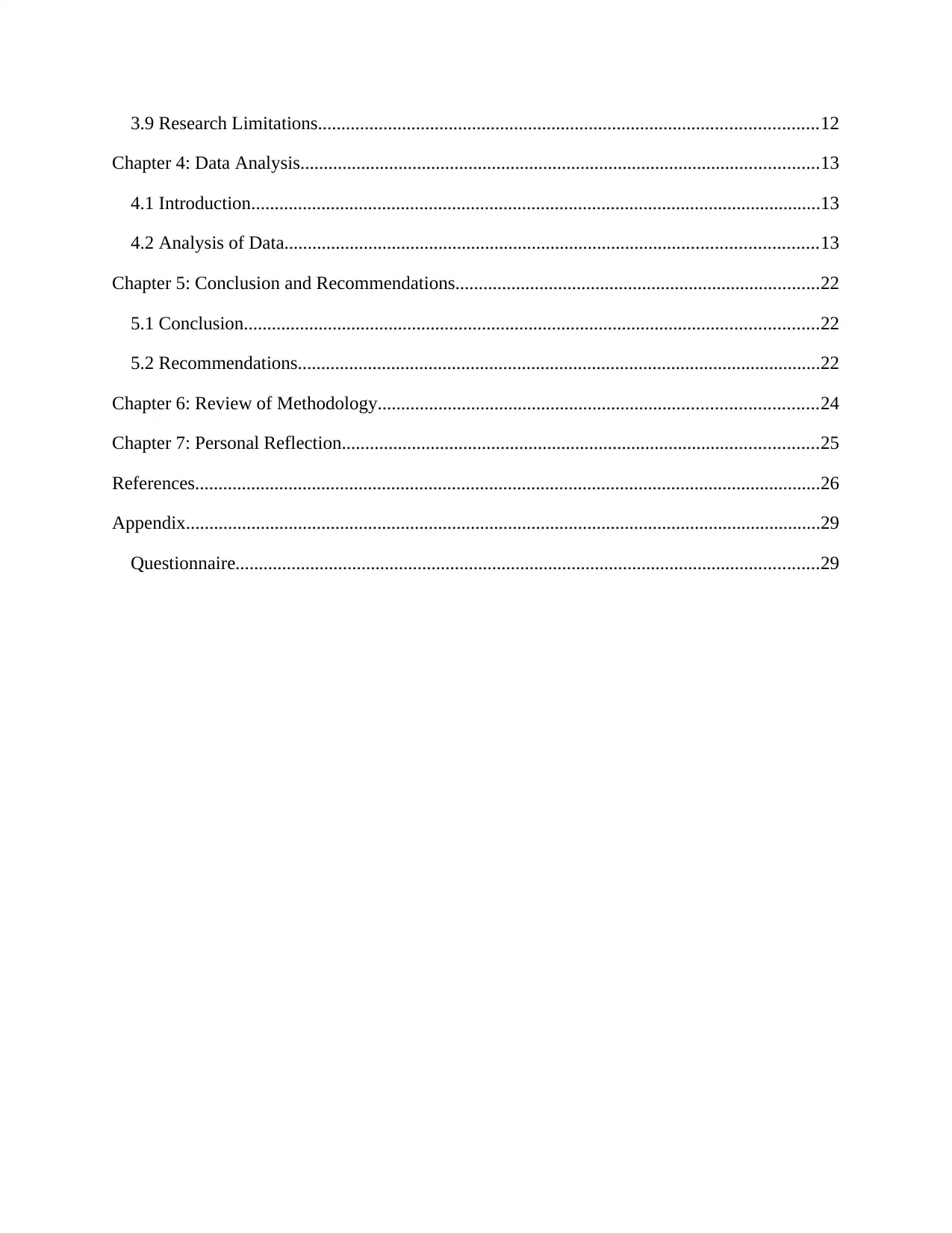
3.9 Research Limitations...........................................................................................................12
Chapter 4: Data Analysis...............................................................................................................13
4.1 Introduction..........................................................................................................................13
4.2 Analysis of Data..................................................................................................................13
Chapter 5: Conclusion and Recommendations..............................................................................22
5.1 Conclusion...........................................................................................................................22
5.2 Recommendations................................................................................................................22
Chapter 6: Review of Methodology..............................................................................................24
Chapter 7: Personal Reflection......................................................................................................25
References......................................................................................................................................26
Appendix........................................................................................................................................29
Questionnaire.............................................................................................................................29
Chapter 4: Data Analysis...............................................................................................................13
4.1 Introduction..........................................................................................................................13
4.2 Analysis of Data..................................................................................................................13
Chapter 5: Conclusion and Recommendations..............................................................................22
5.1 Conclusion...........................................................................................................................22
5.2 Recommendations................................................................................................................22
Chapter 6: Review of Methodology..............................................................................................24
Chapter 7: Personal Reflection......................................................................................................25
References......................................................................................................................................26
Appendix........................................................................................................................................29
Questionnaire.............................................................................................................................29
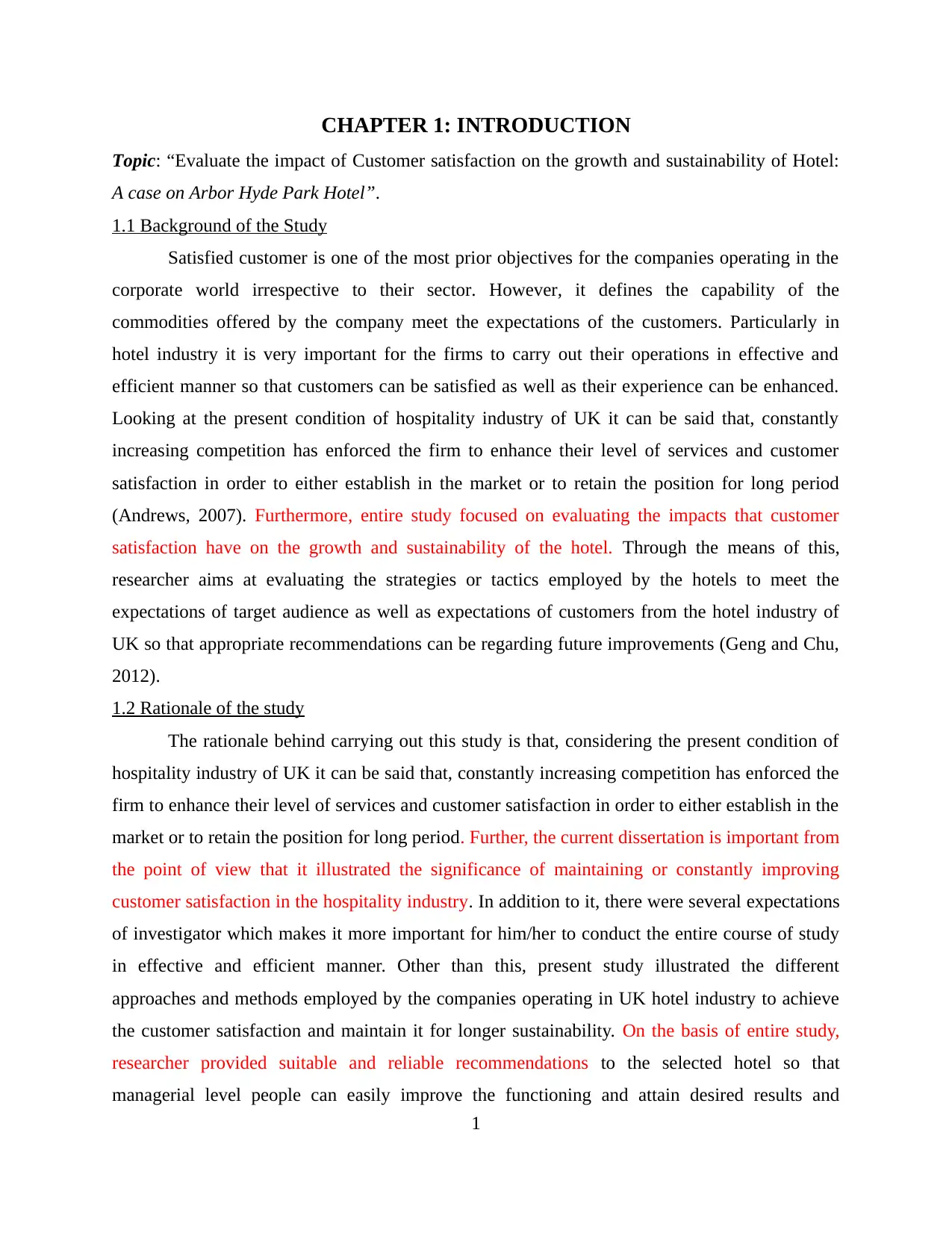
CHAPTER 1: INTRODUCTION
Topic: “Evaluate the impact of Customer satisfaction on the growth and sustainability of Hotel:
A case on Arbor Hyde Park Hotel”.
1.1 Background of the Study
Satisfied customer is one of the most prior objectives for the companies operating in the
corporate world irrespective to their sector. However, it defines the capability of the
commodities offered by the company meet the expectations of the customers. Particularly in
hotel industry it is very important for the firms to carry out their operations in effective and
efficient manner so that customers can be satisfied as well as their experience can be enhanced.
Looking at the present condition of hospitality industry of UK it can be said that, constantly
increasing competition has enforced the firm to enhance their level of services and customer
satisfaction in order to either establish in the market or to retain the position for long period
(Andrews, 2007). Furthermore, entire study focused on evaluating the impacts that customer
satisfaction have on the growth and sustainability of the hotel. Through the means of this,
researcher aims at evaluating the strategies or tactics employed by the hotels to meet the
expectations of target audience as well as expectations of customers from the hotel industry of
UK so that appropriate recommendations can be regarding future improvements (Geng and Chu,
2012).
1.2 Rationale of the study
The rationale behind carrying out this study is that, considering the present condition of
hospitality industry of UK it can be said that, constantly increasing competition has enforced the
firm to enhance their level of services and customer satisfaction in order to either establish in the
market or to retain the position for long period. Further, the current dissertation is important from
the point of view that it illustrated the significance of maintaining or constantly improving
customer satisfaction in the hospitality industry. In addition to it, there were several expectations
of investigator which makes it more important for him/her to conduct the entire course of study
in effective and efficient manner. Other than this, present study illustrated the different
approaches and methods employed by the companies operating in UK hotel industry to achieve
the customer satisfaction and maintain it for longer sustainability. On the basis of entire study,
researcher provided suitable and reliable recommendations to the selected hotel so that
managerial level people can easily improve the functioning and attain desired results and
1
Topic: “Evaluate the impact of Customer satisfaction on the growth and sustainability of Hotel:
A case on Arbor Hyde Park Hotel”.
1.1 Background of the Study
Satisfied customer is one of the most prior objectives for the companies operating in the
corporate world irrespective to their sector. However, it defines the capability of the
commodities offered by the company meet the expectations of the customers. Particularly in
hotel industry it is very important for the firms to carry out their operations in effective and
efficient manner so that customers can be satisfied as well as their experience can be enhanced.
Looking at the present condition of hospitality industry of UK it can be said that, constantly
increasing competition has enforced the firm to enhance their level of services and customer
satisfaction in order to either establish in the market or to retain the position for long period
(Andrews, 2007). Furthermore, entire study focused on evaluating the impacts that customer
satisfaction have on the growth and sustainability of the hotel. Through the means of this,
researcher aims at evaluating the strategies or tactics employed by the hotels to meet the
expectations of target audience as well as expectations of customers from the hotel industry of
UK so that appropriate recommendations can be regarding future improvements (Geng and Chu,
2012).
1.2 Rationale of the study
The rationale behind carrying out this study is that, considering the present condition of
hospitality industry of UK it can be said that, constantly increasing competition has enforced the
firm to enhance their level of services and customer satisfaction in order to either establish in the
market or to retain the position for long period. Further, the current dissertation is important from
the point of view that it illustrated the significance of maintaining or constantly improving
customer satisfaction in the hospitality industry. In addition to it, there were several expectations
of investigator which makes it more important for him/her to conduct the entire course of study
in effective and efficient manner. Other than this, present study illustrated the different
approaches and methods employed by the companies operating in UK hotel industry to achieve
the customer satisfaction and maintain it for longer sustainability. On the basis of entire study,
researcher provided suitable and reliable recommendations to the selected hotel so that
managerial level people can easily improve the functioning and attain desired results and
1
⊘ This is a preview!⊘
Do you want full access?
Subscribe today to unlock all pages.

Trusted by 1+ million students worldwide
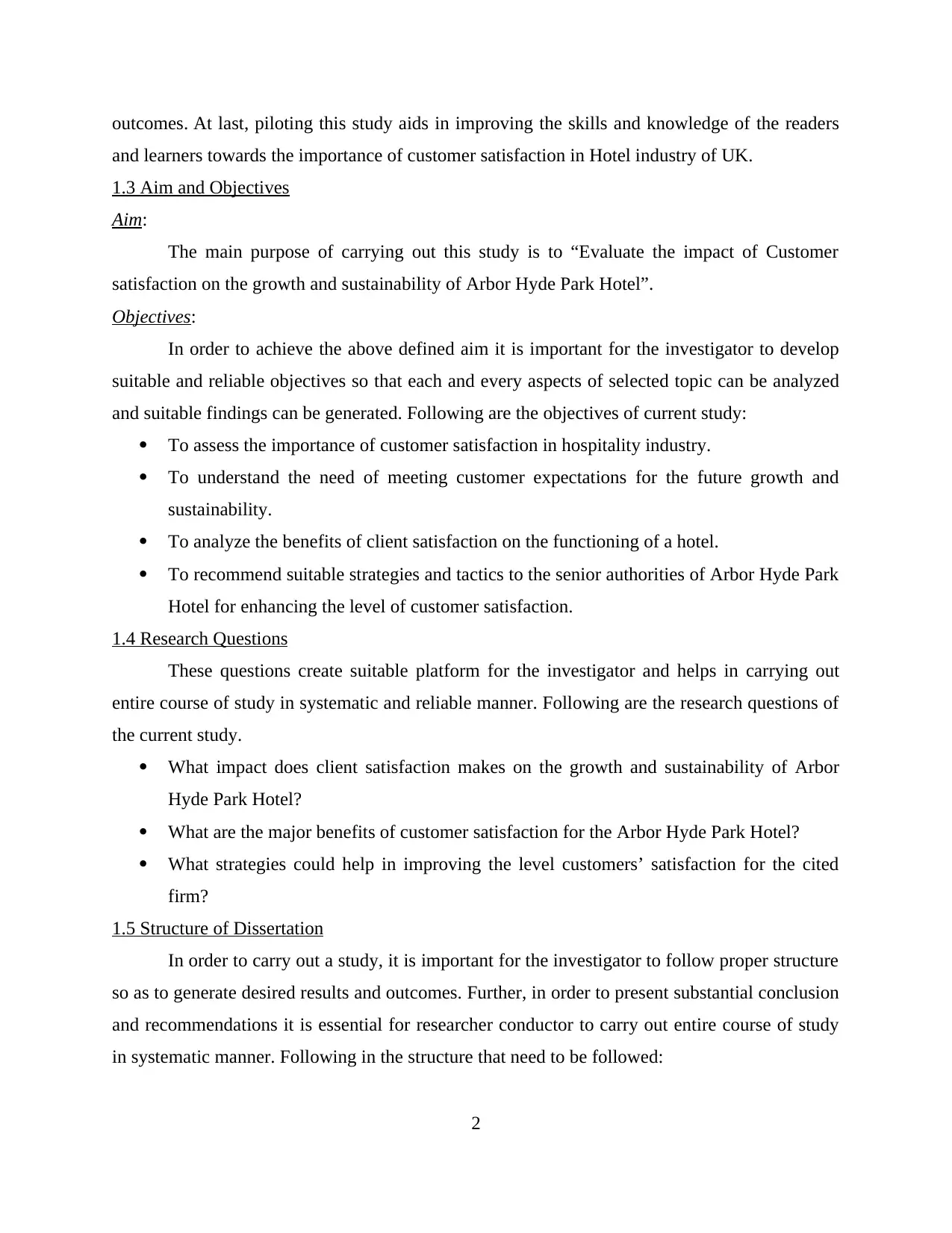
outcomes. At last, piloting this study aids in improving the skills and knowledge of the readers
and learners towards the importance of customer satisfaction in Hotel industry of UK.
1.3 Aim and Objectives
Aim:
The main purpose of carrying out this study is to “Evaluate the impact of Customer
satisfaction on the growth and sustainability of Arbor Hyde Park Hotel”.
Objectives:
In order to achieve the above defined aim it is important for the investigator to develop
suitable and reliable objectives so that each and every aspects of selected topic can be analyzed
and suitable findings can be generated. Following are the objectives of current study:
To assess the importance of customer satisfaction in hospitality industry.
To understand the need of meeting customer expectations for the future growth and
sustainability.
To analyze the benefits of client satisfaction on the functioning of a hotel.
To recommend suitable strategies and tactics to the senior authorities of Arbor Hyde Park
Hotel for enhancing the level of customer satisfaction.
1.4 Research Questions
These questions create suitable platform for the investigator and helps in carrying out
entire course of study in systematic and reliable manner. Following are the research questions of
the current study.
What impact does client satisfaction makes on the growth and sustainability of Arbor
Hyde Park Hotel?
What are the major benefits of customer satisfaction for the Arbor Hyde Park Hotel?
What strategies could help in improving the level customers’ satisfaction for the cited
firm?
1.5 Structure of Dissertation
In order to carry out a study, it is important for the investigator to follow proper structure
so as to generate desired results and outcomes. Further, in order to present substantial conclusion
and recommendations it is essential for researcher conductor to carry out entire course of study
in systematic manner. Following in the structure that need to be followed:
2
and learners towards the importance of customer satisfaction in Hotel industry of UK.
1.3 Aim and Objectives
Aim:
The main purpose of carrying out this study is to “Evaluate the impact of Customer
satisfaction on the growth and sustainability of Arbor Hyde Park Hotel”.
Objectives:
In order to achieve the above defined aim it is important for the investigator to develop
suitable and reliable objectives so that each and every aspects of selected topic can be analyzed
and suitable findings can be generated. Following are the objectives of current study:
To assess the importance of customer satisfaction in hospitality industry.
To understand the need of meeting customer expectations for the future growth and
sustainability.
To analyze the benefits of client satisfaction on the functioning of a hotel.
To recommend suitable strategies and tactics to the senior authorities of Arbor Hyde Park
Hotel for enhancing the level of customer satisfaction.
1.4 Research Questions
These questions create suitable platform for the investigator and helps in carrying out
entire course of study in systematic and reliable manner. Following are the research questions of
the current study.
What impact does client satisfaction makes on the growth and sustainability of Arbor
Hyde Park Hotel?
What are the major benefits of customer satisfaction for the Arbor Hyde Park Hotel?
What strategies could help in improving the level customers’ satisfaction for the cited
firm?
1.5 Structure of Dissertation
In order to carry out a study, it is important for the investigator to follow proper structure
so as to generate desired results and outcomes. Further, in order to present substantial conclusion
and recommendations it is essential for researcher conductor to carry out entire course of study
in systematic manner. Following in the structure that need to be followed:
2
Paraphrase This Document
Need a fresh take? Get an instant paraphrase of this document with our AI Paraphraser
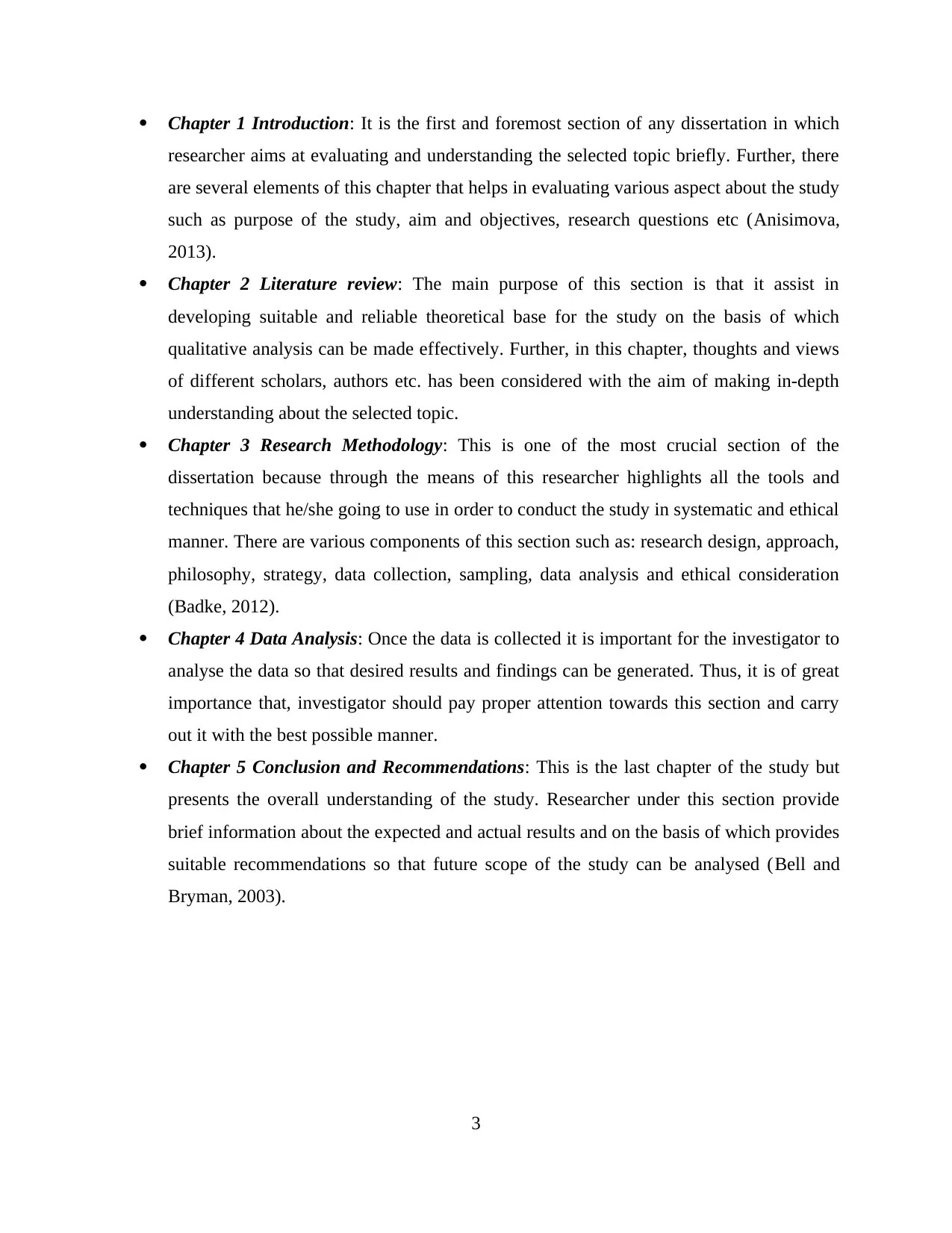
Chapter 1 Introduction: It is the first and foremost section of any dissertation in which
researcher aims at evaluating and understanding the selected topic briefly. Further, there
are several elements of this chapter that helps in evaluating various aspect about the study
such as purpose of the study, aim and objectives, research questions etc (Anisimova,
2013).
Chapter 2 Literature review: The main purpose of this section is that it assist in
developing suitable and reliable theoretical base for the study on the basis of which
qualitative analysis can be made effectively. Further, in this chapter, thoughts and views
of different scholars, authors etc. has been considered with the aim of making in-depth
understanding about the selected topic.
Chapter 3 Research Methodology: This is one of the most crucial section of the
dissertation because through the means of this researcher highlights all the tools and
techniques that he/she going to use in order to conduct the study in systematic and ethical
manner. There are various components of this section such as: research design, approach,
philosophy, strategy, data collection, sampling, data analysis and ethical consideration
(Badke, 2012).
Chapter 4 Data Analysis: Once the data is collected it is important for the investigator to
analyse the data so that desired results and findings can be generated. Thus, it is of great
importance that, investigator should pay proper attention towards this section and carry
out it with the best possible manner.
Chapter 5 Conclusion and Recommendations: This is the last chapter of the study but
presents the overall understanding of the study. Researcher under this section provide
brief information about the expected and actual results and on the basis of which provides
suitable recommendations so that future scope of the study can be analysed (Bell and
Bryman, 2003).
3
researcher aims at evaluating and understanding the selected topic briefly. Further, there
are several elements of this chapter that helps in evaluating various aspect about the study
such as purpose of the study, aim and objectives, research questions etc (Anisimova,
2013).
Chapter 2 Literature review: The main purpose of this section is that it assist in
developing suitable and reliable theoretical base for the study on the basis of which
qualitative analysis can be made effectively. Further, in this chapter, thoughts and views
of different scholars, authors etc. has been considered with the aim of making in-depth
understanding about the selected topic.
Chapter 3 Research Methodology: This is one of the most crucial section of the
dissertation because through the means of this researcher highlights all the tools and
techniques that he/she going to use in order to conduct the study in systematic and ethical
manner. There are various components of this section such as: research design, approach,
philosophy, strategy, data collection, sampling, data analysis and ethical consideration
(Badke, 2012).
Chapter 4 Data Analysis: Once the data is collected it is important for the investigator to
analyse the data so that desired results and findings can be generated. Thus, it is of great
importance that, investigator should pay proper attention towards this section and carry
out it with the best possible manner.
Chapter 5 Conclusion and Recommendations: This is the last chapter of the study but
presents the overall understanding of the study. Researcher under this section provide
brief information about the expected and actual results and on the basis of which provides
suitable recommendations so that future scope of the study can be analysed (Bell and
Bryman, 2003).
3
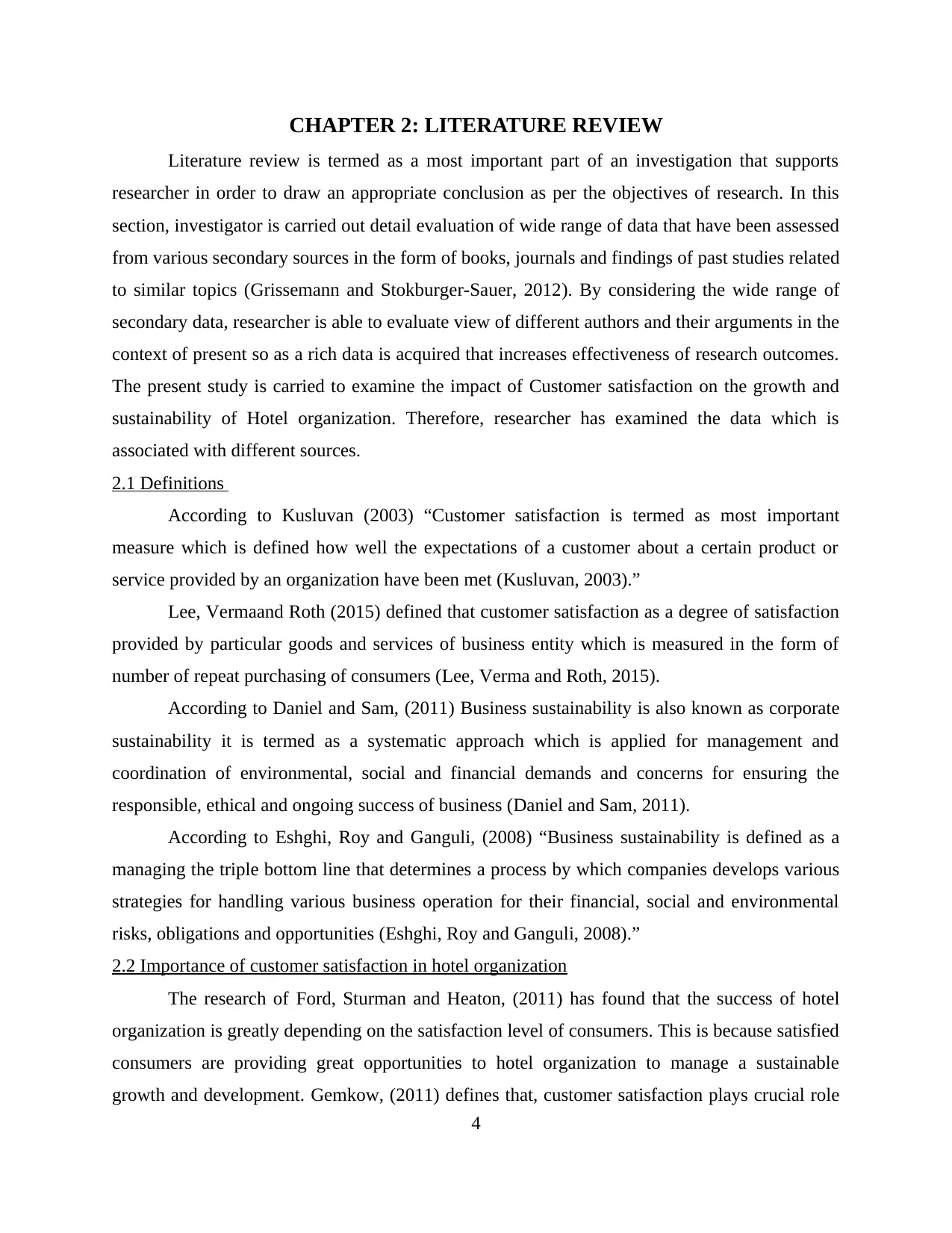
CHAPTER 2: LITERATURE REVIEW
Literature review is termed as a most important part of an investigation that supports
researcher in order to draw an appropriate conclusion as per the objectives of research. In this
section, investigator is carried out detail evaluation of wide range of data that have been assessed
from various secondary sources in the form of books, journals and findings of past studies related
to similar topics (Grissemann and Stokburger-Sauer, 2012). By considering the wide range of
secondary data, researcher is able to evaluate view of different authors and their arguments in the
context of present so as a rich data is acquired that increases effectiveness of research outcomes.
The present study is carried to examine the impact of Customer satisfaction on the growth and
sustainability of Hotel organization. Therefore, researcher has examined the data which is
associated with different sources.
2.1 Definitions
According to Kusluvan (2003) “Customer satisfaction is termed as most important
measure which is defined how well the expectations of a customer about a certain product or
service provided by an organization have been met (Kusluvan, 2003).”
Lee, Vermaand Roth (2015) defined that customer satisfaction as a degree of satisfaction
provided by particular goods and services of business entity which is measured in the form of
number of repeat purchasing of consumers (Lee, Verma and Roth, 2015).
According to Daniel and Sam, (2011) Business sustainability is also known as corporate
sustainability it is termed as a systematic approach which is applied for management and
coordination of environmental, social and financial demands and concerns for ensuring the
responsible, ethical and ongoing success of business (Daniel and Sam, 2011).
According to Eshghi, Roy and Ganguli, (2008) “Business sustainability is defined as a
managing the triple bottom line that determines a process by which companies develops various
strategies for handling various business operation for their financial, social and environmental
risks, obligations and opportunities (Eshghi, Roy and Ganguli, 2008).”
2.2 Importance of customer satisfaction in hotel organization
The research of Ford, Sturman and Heaton, (2011) has found that the success of hotel
organization is greatly depending on the satisfaction level of consumers. This is because satisfied
consumers are providing great opportunities to hotel organization to manage a sustainable
growth and development. Gemkow, (2011) defines that, customer satisfaction plays crucial role
4
Literature review is termed as a most important part of an investigation that supports
researcher in order to draw an appropriate conclusion as per the objectives of research. In this
section, investigator is carried out detail evaluation of wide range of data that have been assessed
from various secondary sources in the form of books, journals and findings of past studies related
to similar topics (Grissemann and Stokburger-Sauer, 2012). By considering the wide range of
secondary data, researcher is able to evaluate view of different authors and their arguments in the
context of present so as a rich data is acquired that increases effectiveness of research outcomes.
The present study is carried to examine the impact of Customer satisfaction on the growth and
sustainability of Hotel organization. Therefore, researcher has examined the data which is
associated with different sources.
2.1 Definitions
According to Kusluvan (2003) “Customer satisfaction is termed as most important
measure which is defined how well the expectations of a customer about a certain product or
service provided by an organization have been met (Kusluvan, 2003).”
Lee, Vermaand Roth (2015) defined that customer satisfaction as a degree of satisfaction
provided by particular goods and services of business entity which is measured in the form of
number of repeat purchasing of consumers (Lee, Verma and Roth, 2015).
According to Daniel and Sam, (2011) Business sustainability is also known as corporate
sustainability it is termed as a systematic approach which is applied for management and
coordination of environmental, social and financial demands and concerns for ensuring the
responsible, ethical and ongoing success of business (Daniel and Sam, 2011).
According to Eshghi, Roy and Ganguli, (2008) “Business sustainability is defined as a
managing the triple bottom line that determines a process by which companies develops various
strategies for handling various business operation for their financial, social and environmental
risks, obligations and opportunities (Eshghi, Roy and Ganguli, 2008).”
2.2 Importance of customer satisfaction in hotel organization
The research of Ford, Sturman and Heaton, (2011) has found that the success of hotel
organization is greatly depending on the satisfaction level of consumers. This is because satisfied
consumers are providing great opportunities to hotel organization to manage a sustainable
growth and development. Gemkow, (2011) defines that, customer satisfaction plays crucial role
4
⊘ This is a preview!⊘
Do you want full access?
Subscribe today to unlock all pages.

Trusted by 1+ million students worldwide
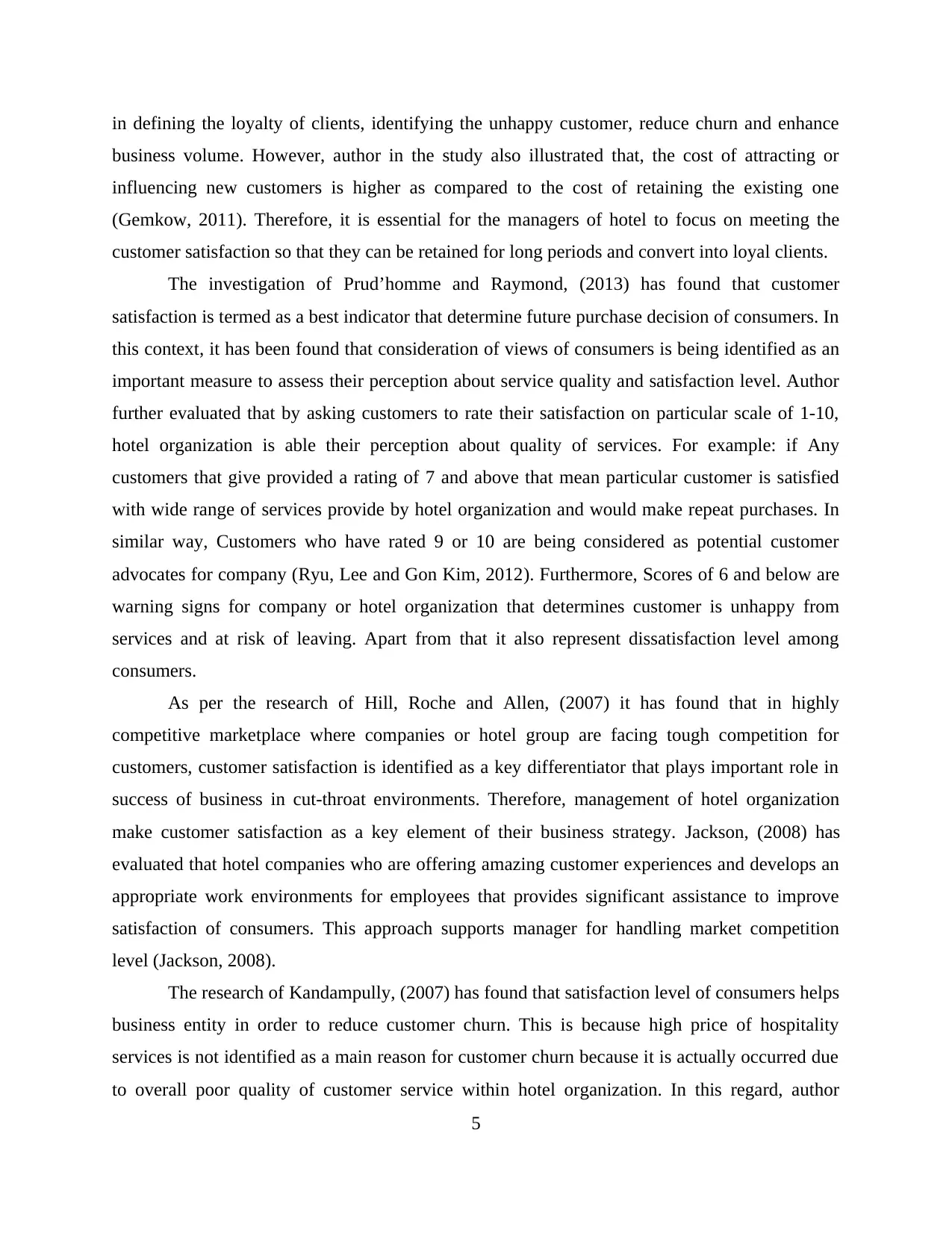
in defining the loyalty of clients, identifying the unhappy customer, reduce churn and enhance
business volume. However, author in the study also illustrated that, the cost of attracting or
influencing new customers is higher as compared to the cost of retaining the existing one
(Gemkow, 2011). Therefore, it is essential for the managers of hotel to focus on meeting the
customer satisfaction so that they can be retained for long periods and convert into loyal clients.
The investigation of Prud’homme and Raymond, (2013) has found that customer
satisfaction is termed as a best indicator that determine future purchase decision of consumers. In
this context, it has been found that consideration of views of consumers is being identified as an
important measure to assess their perception about service quality and satisfaction level. Author
further evaluated that by asking customers to rate their satisfaction on particular scale of 1-10,
hotel organization is able their perception about quality of services. For example: if Any
customers that give provided a rating of 7 and above that mean particular customer is satisfied
with wide range of services provide by hotel organization and would make repeat purchases. In
similar way, Customers who have rated 9 or 10 are being considered as potential customer
advocates for company (Ryu, Lee and Gon Kim, 2012). Furthermore, Scores of 6 and below are
warning signs for company or hotel organization that determines customer is unhappy from
services and at risk of leaving. Apart from that it also represent dissatisfaction level among
consumers.
As per the research of Hill, Roche and Allen, (2007) it has found that in highly
competitive marketplace where companies or hotel group are facing tough competition for
customers, customer satisfaction is identified as a key differentiator that plays important role in
success of business in cut-throat environments. Therefore, management of hotel organization
make customer satisfaction as a key element of their business strategy. Jackson, (2008) has
evaluated that hotel companies who are offering amazing customer experiences and develops an
appropriate work environments for employees that provides significant assistance to improve
satisfaction of consumers. This approach supports manager for handling market competition
level (Jackson, 2008).
The research of Kandampully, (2007) has found that satisfaction level of consumers helps
business entity in order to reduce customer churn. This is because high price of hospitality
services is not identified as a main reason for customer churn because it is actually occurred due
to overall poor quality of customer service within hotel organization. In this regard, author
5
business volume. However, author in the study also illustrated that, the cost of attracting or
influencing new customers is higher as compared to the cost of retaining the existing one
(Gemkow, 2011). Therefore, it is essential for the managers of hotel to focus on meeting the
customer satisfaction so that they can be retained for long periods and convert into loyal clients.
The investigation of Prud’homme and Raymond, (2013) has found that customer
satisfaction is termed as a best indicator that determine future purchase decision of consumers. In
this context, it has been found that consideration of views of consumers is being identified as an
important measure to assess their perception about service quality and satisfaction level. Author
further evaluated that by asking customers to rate their satisfaction on particular scale of 1-10,
hotel organization is able their perception about quality of services. For example: if Any
customers that give provided a rating of 7 and above that mean particular customer is satisfied
with wide range of services provide by hotel organization and would make repeat purchases. In
similar way, Customers who have rated 9 or 10 are being considered as potential customer
advocates for company (Ryu, Lee and Gon Kim, 2012). Furthermore, Scores of 6 and below are
warning signs for company or hotel organization that determines customer is unhappy from
services and at risk of leaving. Apart from that it also represent dissatisfaction level among
consumers.
As per the research of Hill, Roche and Allen, (2007) it has found that in highly
competitive marketplace where companies or hotel group are facing tough competition for
customers, customer satisfaction is identified as a key differentiator that plays important role in
success of business in cut-throat environments. Therefore, management of hotel organization
make customer satisfaction as a key element of their business strategy. Jackson, (2008) has
evaluated that hotel companies who are offering amazing customer experiences and develops an
appropriate work environments for employees that provides significant assistance to improve
satisfaction of consumers. This approach supports manager for handling market competition
level (Jackson, 2008).
The research of Kandampully, (2007) has found that satisfaction level of consumers helps
business entity in order to reduce customer churn. This is because high price of hospitality
services is not identified as a main reason for customer churn because it is actually occurred due
to overall poor quality of customer service within hotel organization. In this regard, author
5
Paraphrase This Document
Need a fresh take? Get an instant paraphrase of this document with our AI Paraphraser
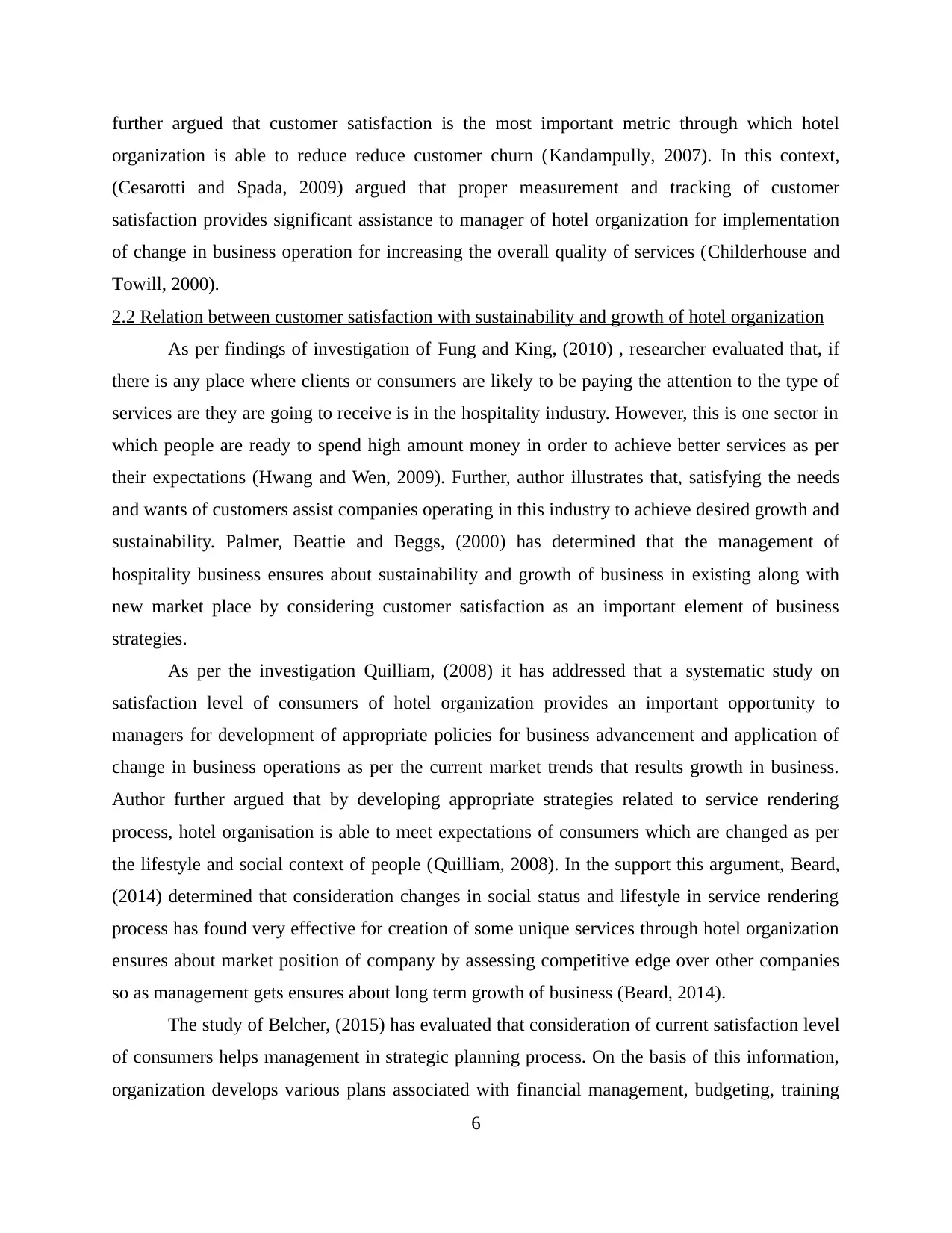
further argued that customer satisfaction is the most important metric through which hotel
organization is able to reduce reduce customer churn (Kandampully, 2007). In this context,
(Cesarotti and Spada, 2009) argued that proper measurement and tracking of customer
satisfaction provides significant assistance to manager of hotel organization for implementation
of change in business operation for increasing the overall quality of services (Childerhouse and
Towill, 2000).
2.2 Relation between customer satisfaction with sustainability and growth of hotel organization
As per findings of investigation of Fung and King, (2010) , researcher evaluated that, if
there is any place where clients or consumers are likely to be paying the attention to the type of
services are they are going to receive is in the hospitality industry. However, this is one sector in
which people are ready to spend high amount money in order to achieve better services as per
their expectations (Hwang and Wen, 2009). Further, author illustrates that, satisfying the needs
and wants of customers assist companies operating in this industry to achieve desired growth and
sustainability. Palmer, Beattie and Beggs, (2000) has determined that the management of
hospitality business ensures about sustainability and growth of business in existing along with
new market place by considering customer satisfaction as an important element of business
strategies.
As per the investigation Quilliam, (2008) it has addressed that a systematic study on
satisfaction level of consumers of hotel organization provides an important opportunity to
managers for development of appropriate policies for business advancement and application of
change in business operations as per the current market trends that results growth in business.
Author further argued that by developing appropriate strategies related to service rendering
process, hotel organisation is able to meet expectations of consumers which are changed as per
the lifestyle and social context of people (Quilliam, 2008). In the support this argument, Beard,
(2014) determined that consideration changes in social status and lifestyle in service rendering
process has found very effective for creation of some unique services through hotel organization
ensures about market position of company by assessing competitive edge over other companies
so as management gets ensures about long term growth of business (Beard, 2014).
The study of Belcher, (2015) has evaluated that consideration of current satisfaction level
of consumers helps management in strategic planning process. On the basis of this information,
organization develops various plans associated with financial management, budgeting, training
6
organization is able to reduce reduce customer churn (Kandampully, 2007). In this context,
(Cesarotti and Spada, 2009) argued that proper measurement and tracking of customer
satisfaction provides significant assistance to manager of hotel organization for implementation
of change in business operation for increasing the overall quality of services (Childerhouse and
Towill, 2000).
2.2 Relation between customer satisfaction with sustainability and growth of hotel organization
As per findings of investigation of Fung and King, (2010) , researcher evaluated that, if
there is any place where clients or consumers are likely to be paying the attention to the type of
services are they are going to receive is in the hospitality industry. However, this is one sector in
which people are ready to spend high amount money in order to achieve better services as per
their expectations (Hwang and Wen, 2009). Further, author illustrates that, satisfying the needs
and wants of customers assist companies operating in this industry to achieve desired growth and
sustainability. Palmer, Beattie and Beggs, (2000) has determined that the management of
hospitality business ensures about sustainability and growth of business in existing along with
new market place by considering customer satisfaction as an important element of business
strategies.
As per the investigation Quilliam, (2008) it has addressed that a systematic study on
satisfaction level of consumers of hotel organization provides an important opportunity to
managers for development of appropriate policies for business advancement and application of
change in business operations as per the current market trends that results growth in business.
Author further argued that by developing appropriate strategies related to service rendering
process, hotel organisation is able to meet expectations of consumers which are changed as per
the lifestyle and social context of people (Quilliam, 2008). In the support this argument, Beard,
(2014) determined that consideration changes in social status and lifestyle in service rendering
process has found very effective for creation of some unique services through hotel organization
ensures about market position of company by assessing competitive edge over other companies
so as management gets ensures about long term growth of business (Beard, 2014).
The study of Belcher, (2015) has evaluated that consideration of current satisfaction level
of consumers helps management in strategic planning process. On the basis of this information,
organization develops various plans associated with financial management, budgeting, training
6
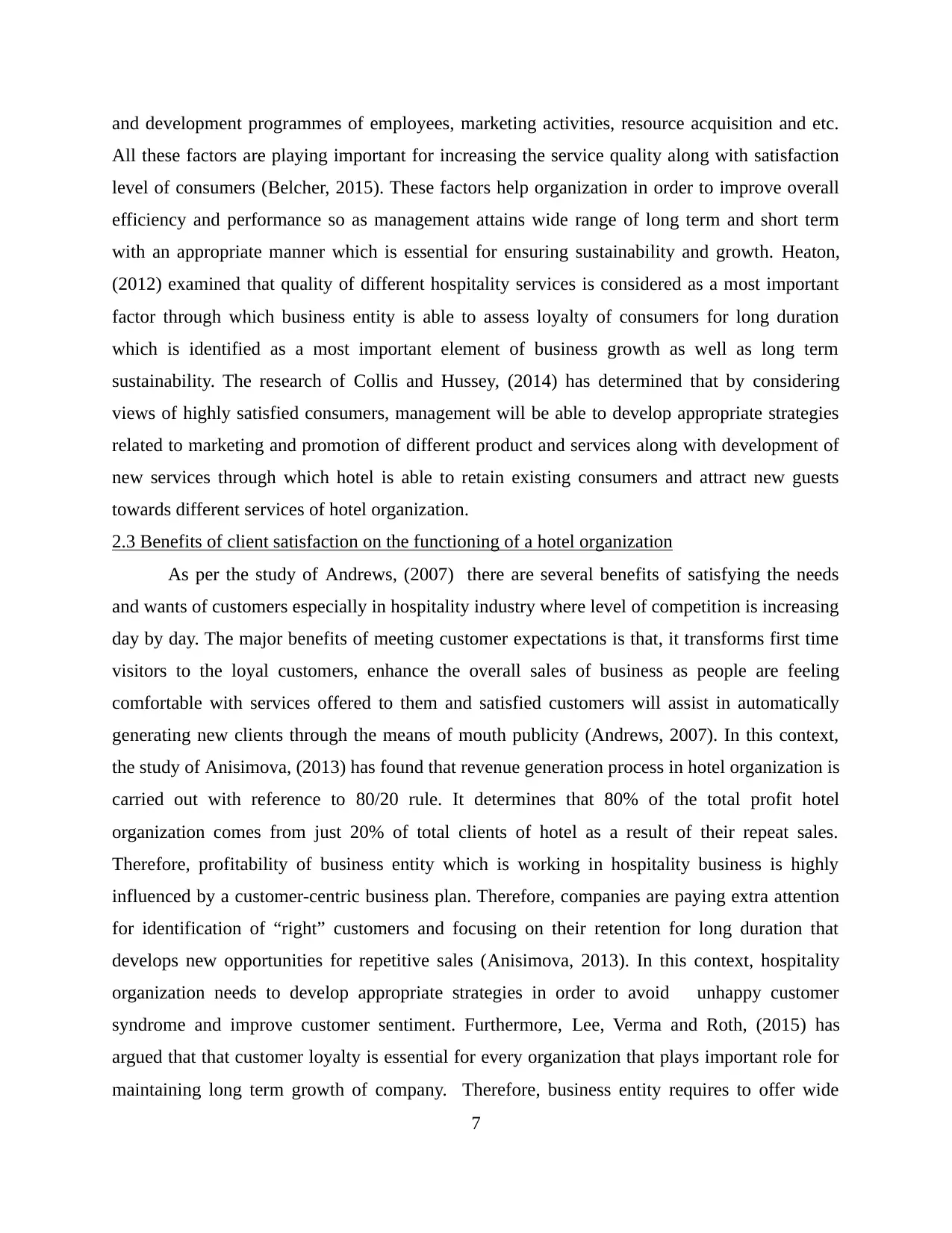
and development programmes of employees, marketing activities, resource acquisition and etc.
All these factors are playing important for increasing the service quality along with satisfaction
level of consumers (Belcher, 2015). These factors help organization in order to improve overall
efficiency and performance so as management attains wide range of long term and short term
with an appropriate manner which is essential for ensuring sustainability and growth. Heaton,
(2012) examined that quality of different hospitality services is considered as a most important
factor through which business entity is able to assess loyalty of consumers for long duration
which is identified as a most important element of business growth as well as long term
sustainability. The research of Collis and Hussey, (2014) has determined that by considering
views of highly satisfied consumers, management will be able to develop appropriate strategies
related to marketing and promotion of different product and services along with development of
new services through which hotel is able to retain existing consumers and attract new guests
towards different services of hotel organization.
2.3 Benefits of client satisfaction on the functioning of a hotel organization
As per the study of Andrews, (2007) there are several benefits of satisfying the needs
and wants of customers especially in hospitality industry where level of competition is increasing
day by day. The major benefits of meeting customer expectations is that, it transforms first time
visitors to the loyal customers, enhance the overall sales of business as people are feeling
comfortable with services offered to them and satisfied customers will assist in automatically
generating new clients through the means of mouth publicity (Andrews, 2007). In this context,
the study of Anisimova, (2013) has found that revenue generation process in hotel organization is
carried out with reference to 80/20 rule. It determines that 80% of the total profit hotel
organization comes from just 20% of total clients of hotel as a result of their repeat sales.
Therefore, profitability of business entity which is working in hospitality business is highly
influenced by a customer-centric business plan. Therefore, companies are paying extra attention
for identification of “right” customers and focusing on their retention for long duration that
develops new opportunities for repetitive sales (Anisimova, 2013). In this context, hospitality
organization needs to develop appropriate strategies in order to avoid unhappy customer
syndrome and improve customer sentiment. Furthermore, Lee, Verma and Roth, (2015) has
argued that that customer loyalty is essential for every organization that plays important role for
maintaining long term growth of company. Therefore, business entity requires to offer wide
7
All these factors are playing important for increasing the service quality along with satisfaction
level of consumers (Belcher, 2015). These factors help organization in order to improve overall
efficiency and performance so as management attains wide range of long term and short term
with an appropriate manner which is essential for ensuring sustainability and growth. Heaton,
(2012) examined that quality of different hospitality services is considered as a most important
factor through which business entity is able to assess loyalty of consumers for long duration
which is identified as a most important element of business growth as well as long term
sustainability. The research of Collis and Hussey, (2014) has determined that by considering
views of highly satisfied consumers, management will be able to develop appropriate strategies
related to marketing and promotion of different product and services along with development of
new services through which hotel is able to retain existing consumers and attract new guests
towards different services of hotel organization.
2.3 Benefits of client satisfaction on the functioning of a hotel organization
As per the study of Andrews, (2007) there are several benefits of satisfying the needs
and wants of customers especially in hospitality industry where level of competition is increasing
day by day. The major benefits of meeting customer expectations is that, it transforms first time
visitors to the loyal customers, enhance the overall sales of business as people are feeling
comfortable with services offered to them and satisfied customers will assist in automatically
generating new clients through the means of mouth publicity (Andrews, 2007). In this context,
the study of Anisimova, (2013) has found that revenue generation process in hotel organization is
carried out with reference to 80/20 rule. It determines that 80% of the total profit hotel
organization comes from just 20% of total clients of hotel as a result of their repeat sales.
Therefore, profitability of business entity which is working in hospitality business is highly
influenced by a customer-centric business plan. Therefore, companies are paying extra attention
for identification of “right” customers and focusing on their retention for long duration that
develops new opportunities for repetitive sales (Anisimova, 2013). In this context, hospitality
organization needs to develop appropriate strategies in order to avoid unhappy customer
syndrome and improve customer sentiment. Furthermore, Lee, Verma and Roth, (2015) has
argued that that customer loyalty is essential for every organization that plays important role for
maintaining long term growth of company. Therefore, business entity requires to offer wide
7
⊘ This is a preview!⊘
Do you want full access?
Subscribe today to unlock all pages.

Trusted by 1+ million students worldwide
1 out of 37
Related Documents
Your All-in-One AI-Powered Toolkit for Academic Success.
+13062052269
info@desklib.com
Available 24*7 on WhatsApp / Email
![[object Object]](/_next/static/media/star-bottom.7253800d.svg)
Unlock your academic potential
Copyright © 2020–2026 A2Z Services. All Rights Reserved. Developed and managed by ZUCOL.





